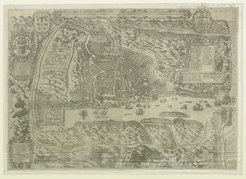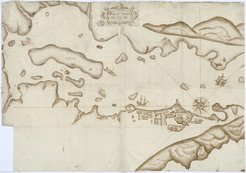From the south of the world: translating normativities in the Irmandade de Nossa Senhora da Misericórdia (Goa and Rio de Janeiro, c. 1640s – c. 1750)
PhD Poject

The Irmandade de Nossa Senhora da Misericórdia was a charitable brotherhood that emerged in Lisbon in 1498 and spread, at the same time as the “Iberian mundialization”, into the multiple spaces of the Portuguese empire. As an institution comprised of members of elites, it established a space for the pursuit of privileges, affirmation of power and rights, and also for conflicts within the Portuguese empire. Within this institution, debates were held and local decisions taken. The jurisdiction of Misericórdias, sanctioned by the monarch in Lisbon, often did not submit to local powers, which demonstrates its political weight within local dynamics. Some of the members of the Misericórdia, such as the provedores, who held leading positions within the brotherhood, were often members of the political scenario in those local communities.
In recent decades, historiography, especially in Brazil and Portugal, has presented the Misericórdias as one of the pillars of the Portuguese empire, only from a Eurocentric perspective, i.e. based on an analysis still limited to the developments of the historically hegemonic area, the global “North”. In order to understand the establishment of the Brotherhood of Misericórdia, we will broaden our perspective by focusing on historical processes from the connections both within the “South of the world” and those reaching out from there to the wider world.
The geographic approach focuses on the Misericórdias located in Rio de Janeiro and Goa, based on the importance that both cities acquired in the spaces that made up the Portuguese empire during the seventeenth and eighteenth centuries. The temporal approach is justified by the possibility of understanding the social relations that supported a certain political culture, to unveil the context called the “structural turn”, a moment when the empire, supposedly, turned its dominions from Asia to the Atlantic.

The documentary set that will allow an approximation with our object is scattered among archives around the world, such as the Arquivo Geral Santa Casa da Misericórdia do Rio de Janeiro, the Arquivo Histórico de Goa, the Arquivo Nacional da Torre do Tombo and the Arquivo Histórico Ultramarino. They contain information about the administrative trajectories of the men who managed the Misericórdias, which brings our gaze closer to the daily life of the cities of Rio de Janeiro and Goa. At the same time, elections to as well as dispatches of the Misericordia’s board highlight governance practices.
Thus, a detailed analysis of the individuals who occupied the position of provedores in Rio de Janeiro and Goa is necessary to better understand the role of Misericórdia with regard to its local institutionalization and in relation to the strengthening of the Portuguese Empire itself. This allows us to uncover the reason why various historical agents who had political and symbolic capital chose, and even competed, to occupy the position of the Brotherhood’s provedor. This position is a starting point for understanding the role of Misericórdia as a producer of normativities, which is (re)signified from the everyday practice with local societies.
The doctoral project aims to analyze the role of the Irmandade de Nossa Senhora da Misericórdia during the Early Modern Period to understand how these institutions established themselves in the most distinct areas of the Portuguese Crown. The Misericórdias and their provedores were producers of a set of practices, discourses, and norms that served to shape the construction of normativity in a global context. The practices based on the obras da Misericórdia (works of mercy) allowed the monopoly of important rites within colonial societies, such as the monopoly on funerals and the administrations of legados pios (pious legacies) institutes from the establishment of masses and chapels destined for the salvation of souls. From this understanding, it is possible to consider the institution and its managers as privileged historical agents to perceive the formation of a “governance regime”. Thus, I argue that the spaces of meetings and decision-making within the Misericórdia favored the creation of alliances, certainly decisive, capable of influencing other spheres of the established societies.

